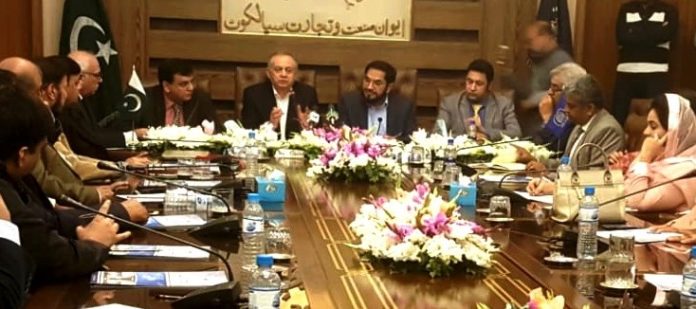SIALKOT: The adviser to Prime Minister for Commerce, Textile, Industries, Production and Investment Abdul Razzak Dawood on Sunday, urged Sialkot’s exporters to try and strategically boost national exports, while the government would do its utmost to facilitate them.
He said that the government was coming up with effective policies to boost the industrial sector of the country and take the business community into confidence to ensure complete implementation of investment-friendly policies.
He stated this while addressing an important meeting of exporters held at the Sialkot Chamber of Commerce and Industry (SCCI) on Sunday.
He announced his full support for Sialkot for the early establishment of a Special Economic Zone at Sialkot. He said that Pakistan should also follow the model of reverse engineering adopted by China and Japan. He asked the exporters to start their own branding in South Africa and other African countries as well.
SCCI President Khawaja Masud Akhtar, SCCI SVP Waqas Akram Awan, Sialkot exporter’s leader Riaz ud Din Sheikh, senior Trade Development Authority Pakistan (TDAP) and Federal Board of Revenue (FBR) officials along with SCCI’s former presidents, SVPs and VPs also attended the event.
The PM’s adviser assured the audience that the government would soon abolish all the duties and taxes on the import of raw materials. He said that the DTRE facilities should be made easier. He assured to look into the matter of pending DLTL cases to facilitate Sialkot’s exporters as well.
He said that the issue of 5 per cent regulatory duty on the import of polyester yarn and 7 per cent anti-dumping duty would be resolved in the month of December.
He further said that the government was fully aware of the problems being faced by the business community.
Advisor Abdul Razak Dawood said that the role of the Federal Board of Revenue (FBR) was being redefined to only taxes collection from levying taxes. “I have sent a summary to the government under which the FBR would not levy any tax directly, as the FBR’s role would be to collect taxes, and not to levy any tax directly,” he remarked.




